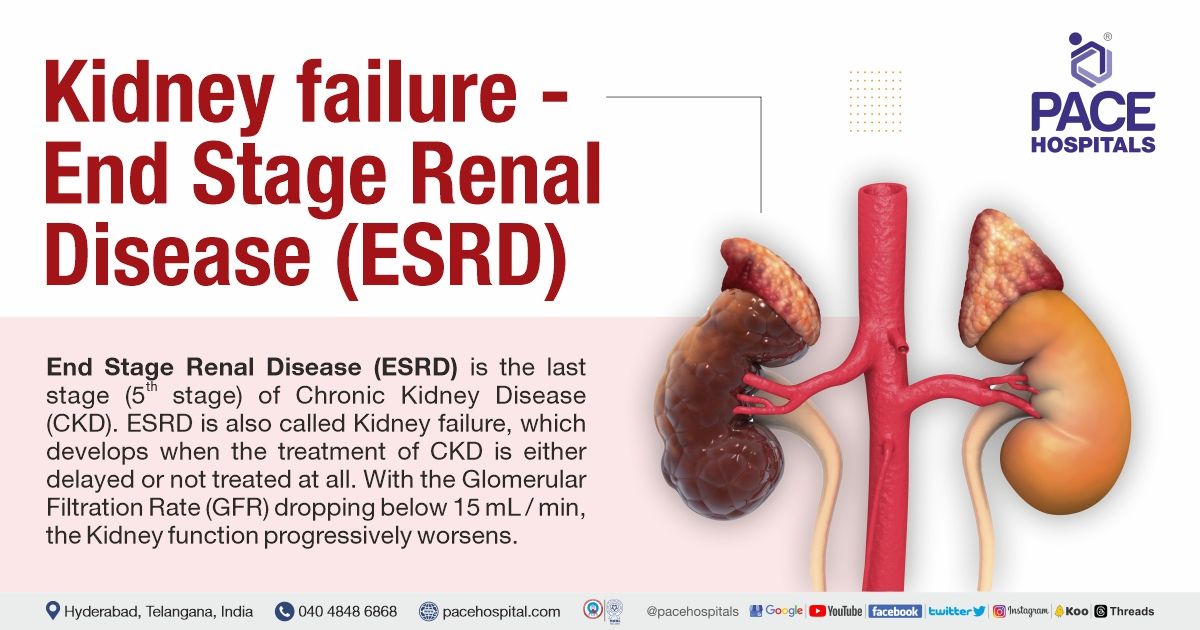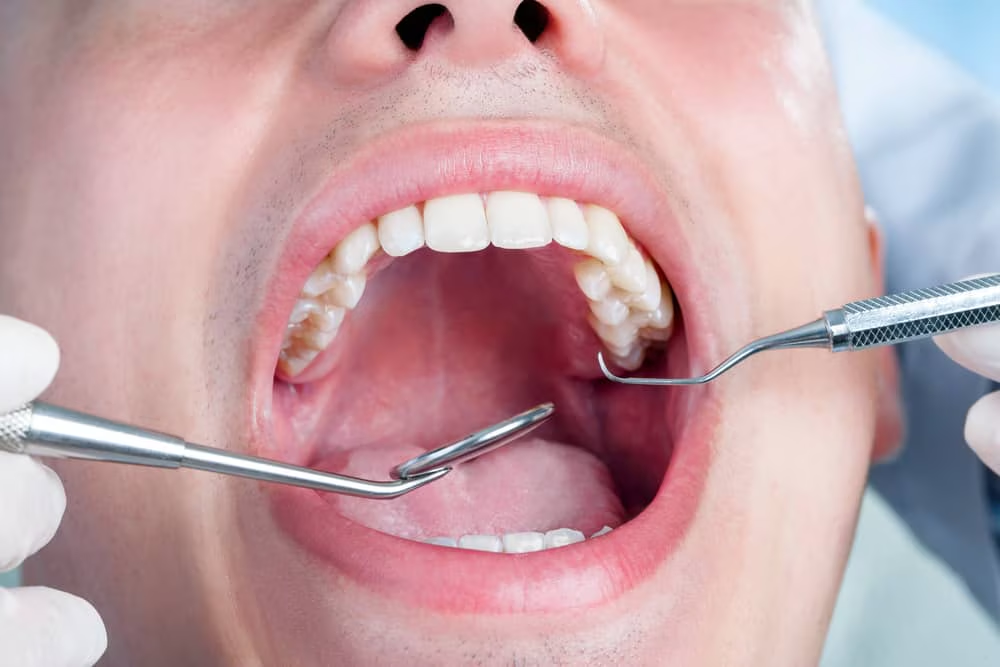In this section:
- What are the symptoms of kidney failure?
- What health problems can people with kidney disease develop?
- How can I live well with kidney failure?
- Can I be active with kidney failure?
- Will kidney failure affect my sleep?
- Will kidney failure affect my sex life?
- Can I keep working with kidney failure?
- How will kidney failure affect how I feel about my life?
- Who will be on my health care team?
If your kidney function drops below 15 percent of normal, you are said to have kidney failure. You may have symptoms from the buildup of waste products and extra water in your body.
To replace your lost kidney function, you may have one of three treatment options:
End-stage renal disease (ESRD) is kidney failure that is treated by dialysis or kidney transplant.
Some people with kidney failure choose not to have dialysis or a transplant but continue to receive care from their health care team, take medicines, and monitor their diet and lifestyle choices.
Work with your health care team and family to consider your options and choose a treatment that’s right for you. Treatment will help you feel better and live longer.
The more you know ahead of time about what to expect, the better prepared you may be to make a treatment choice and take charge of your care. You also need to give yourself time to get used to the big changes that will be happening in your life. Kidney failure will change your day-to-day activities and may change your relationships with friends and family, and how you feel.

What are the symptoms of kidney failure?
Symptoms of kidney failure may begin so slowly that you don’t notice them right away.
Healthy kidneys prevent the buildup of wastes and extra fluid in your body and balance the salts and minerals in your blood—such as calcium, phosphorus, sodium, and potassium. Your kidneys also make hormones that help control blood pressure, make red blood cells, and keep your bones strong.
Kidney failure means your kidneys no longer work well enough to do these jobs and, as a result, other health problems develop. As your kidney function goes down, you may
- have swelling, usually in your legs, feet, or ankles
- get headaches
- feel itchy
- feel tired during the day and have sleep problems at night
- feel sick to your stomach, lose your sense of taste, not feel hungry, or lose weight
- make little or no urine
- have muscle cramps, weakness, or numbness
- have pain, stiffness, or fluid in your joints
- feel confused, have trouble focusing, or have memory problems
Following your treatment plan can help you avoid or address most of these symptoms. Your treatment plan may include regular dialysis treatments or a kidney transplant, a special eating plan, physical activity, and medicines.
What health problems can people with kidney disease develop?
Kidney disease can lead to other health problems. Your health care team will work with you to help you avoid or manage:
High blood pressure. High blood pressure can be both a cause and a result of kidney disease. High blood pressure damages your kidneys, and damaged kidneys don’t work as well to help control your blood pressure. With kidney failure, your kidneys can’t get rid of extra water. Taking in too much water can cause swelling, raise your blood pressure, and make your heart work harder.
Blood pressure-lowering medicines, limiting sodium and fluids in your diet, staying physically active, managing stress, and quitting smoking can help you control your blood pressure.
Heart disease. Kidney disease and heart disease share two of the same main causes: diabetes and high blood pressure. People with kidney disease are at high risk for heart disease, and people with heart disease are at high risk for kidney disease.
The steps that you take to manage your kidney disease, blood pressure, cholesterol, and blood glucose (if you have diabetes) will also help you prevent heart attacks or strokes.
Anemia. When kidneys are damaged, they don’t make enough erythropoietin (EPO), a hormone that helps make red blood cells. Red blood cells carry oxygen from your lungs to other parts of your body. When you have anemia, some organs—such as your brain and heart—may get less oxygen than they need and may not function as well as they should. Anemia can make you feel weak and lack energy.
Your health care professional may prescribe iron supplements. In some cases, your professional may prescribe medicines to help your body make more red blood cells.
Mineral and Bone Disorder. Healthy kidneys balance the levels of calcium and phosphorus in your blood and make hormones that help keep your bones strong. As kidney function drops, your kidneys
- make less of the hormone that helps your body absorb calcium. Like one domino knocking over another, the low level of calcium in your blood triggers the release of parathyroid hormone (PTH). PTH moves calcium from your bones into your blood. Too much PTH can also make you feel itchy.
- don’t remove as much phosphorus. Extra phosphorus in your blood also pulls calcium from your bones.
Without treatment, bones may become thin and weak. You may feel bone or joint pain. Changes to your eating plan, medicines, supplements, and dialysis may help.

Malnutrition. As your kidney disease gets worse, it can be a challenge to keep yourself well fed. You may not feel hungry, food may taste different, or you may lose interest in food. Infections and other stresses on your body can make it hard for your body to use the food you do eat. Working closely with a dietitian to be sure you’re eating enough of the right foods can have long-term benefits for people with kidney disease.
Feeling itchy. Itching is common and happens for different reasons. You may feel itchy because you have dry skin. Using a moisturizer may help. Or, you may feel itchy because you have too much phosphorus in your blood. Eating less phosphorus may help stop the itching. Your health care provider may prescribe a medicine called a phosphate binder for you to take with meals. These medicines keep the phosphorus in your food from entering your bloodstream.
UV light from sunlight or a light box helps some people find relief.
How can I live well with kidney failure?
Doing well with kidney failure is a challenge. You will feel better if you
- stick to your treatment schedule
- review your medicines with your health care provider at every visit and take your medicines as prescribed
- work with a dietitian to develop an eating plan that includes foods you enjoy eating while also helping your health
- stay active—take a walk or do some other physical activity that you enjoy
- stay in touch with your friends and family
Treatment with dialysis or transplant will help you feel better and live longer. Your health care team will work with you to create a treatment plan to address any health problems you have. Your treatment will include steps you can take to maintain your quality of life and activity level.
Your eating plan plays an important role. When you have kidney failure, what you eat and drink may help you maintain a healthy balance of salts, minerals, and fluids in your body.
Can I be active with kidney failure?
Yes. Physical activity is an important part of staying healthy when you have kidney failure. Being active makes your muscles, bones, and heart stronger. Physical activity also makes your blood travel through your body faster so your body gets more oxygen. Your body needs oxygen to use the energy from food.
You may find that physical activity can also improve your mood and make you feel better.
Talk with your doctor before you start a new exercise routine. Start slowly, with easier activities such as walking at a normal pace or gardening. Work up to harder activities such as walking briskly. Aim to be active on as many days as possible.

Will kidney failure affect my sleep?
People who have kidney failure may have trouble sleeping NIH external link. Sleep loss can affect your quality of life, energy level, and mood. Restless leg syndrome NIH external link, sleep apnea NIH external link, pain, or itching may make it hard for you to sleep.
You can take a number of steps to improve your sleep habits NIH external link. For example, physical activity during the day and a warm bath before bed may help you sleep better at night. Avoid caffeine after lunchtime. Avoid alcoholic drinks before bed. Avoid smoking.
Talk with your health care provider if you often feel sleepy during the day or have trouble sleeping at night. Health care providers can treat sleep disorders such as sleep apnea or restless leg syndrome.
Will kidney failure affect my sex life?
Kidney failure will affect your emotions, nerves, hormones, and energy levels, all of which may change your sexual relationships. Taking good care of yourself by managing your kidney disease and controlling your blood pressure and blood glucose levels can help prevent some sexual problems, such as erectile dysfunction. Getting counseling may help with some emotional problems, such as anxiety and depression, which can get in the way of having satisfying sex.
You may feel shy asking questions about your sex life, but your health care team has heard the same questions from other people. Your provider is trained to help you address concerns about your sex life.
Can I keep working with kidney failure?
Many people with kidney failure continue to work. KidneyWorks is a program to help people with kidney disease keep working External link. The program focuses on Americans with CKD whose kidneys have not yet failed or who are living with a transplant. If you are on dialysis, the information in the KidneyWorks paper may also provide tips to help you keep your job.
The Americans with Disabilities Act External link means that an employer can’t legally fire you just because you’re on dialysis or have had a kidney transplant. The law requires an employer to make reasonable changes to the workplace for a person with a disability. For example, your employer may give you lighter physical jobs or schedule your work hours around your dialysis sessions. If you’re on peritoneal dialysis, you’ll need space and time to change the dialysis solution in the middle of the work day. Most employers can make these adjustments.
If your employer isn’t willing to meet your needs, your dialysis clinic’s renal social worker may be able to help find a way to satisfy both you and your employer.

How will kidney failure affect how I feel about my life?
Coping with kidney failure can be stressful. Some of the steps that you are taking to manage your kidney disease are also healthy ways to cope with stress. For example, physical activity and sleep help reduce stress. Learn more about healthy ways to cope with stress NIH external link.
Depression is common among people with a chronic, or long-term, illness NIH external link. Depression can make it harder to manage your kidney disease. Ask for help if you feel down. Your health care team can help you. Talking with a support group, clergy member, friend, or family member who’ll listen to your feelings may help.
Treatment for depression is available.
Who will be on my health care team?
You’ll have a whole team of trained health care providers to help you live well with kidney failure. The following people may be part of your health care team:
Nephrologist. A doctor who specializes in kidney health and oversees your treatment.
Dialysis nurse. A dialysis nurse will monitor your in-center dialysis and will see you monthly if you’re doing home or peritoneal dialysis. The nurse will make sure you’re taking your medicines correctly and help you find ways to lessen the side effects of dialysis. If you do home hemodialysis or peritoneal dialysis, your dialysis nurse will teach you how to set up your treatment, take care of the equipment, and watch for infections or other problems.
Transplant coordinator. A specially trained nurse who will be your point of contact, arrange your appointments, and teach you what to do before and after the transplant.
Renal dietitian. A renal dietitian is trained to help people with kidney failure. Your dietitian will help you make choices about what to eat and drink to help your treatment work better so you’ll feel better.
Social worker. Dialysis clinics and transplant centers have a social worker who works with people who have ESRD. Your renal social worker can help you find answers to problems such as
- keeping a job or changing jobs
- getting help paying for treatments
- finding services to help with transportation or chores around the house
- finding counseling services to deal with family problems
Family and friends. Allowing your friends and family to help and sharing news about your kidney disease can make a big difference in how you feel. Studies show that being connected to other people can help your health.
A strong support system of family and friends can make it easier to deal with health problems and life changes. Be sure to spend time with friends or keep in touch with them by phone or email. Stay involved in activities that interest you.

You. Taking charge of your own medical care can help you feel more in control of your life. Take all your medicines and keep all your appointments. Work with your health care team to learn about different kidney failure treatments, and let them know what kind of treatment you want. Ask questions when your health care provider tells you something you don’t understand. If you choose home hemodialysis or peritoneal dialysis, tell your dialysis nurse about any problems you have with equipment or supplies. If you have a transplant, talk with your transplant coordinator if your medicines cause side effects. You are your own best advocate.




